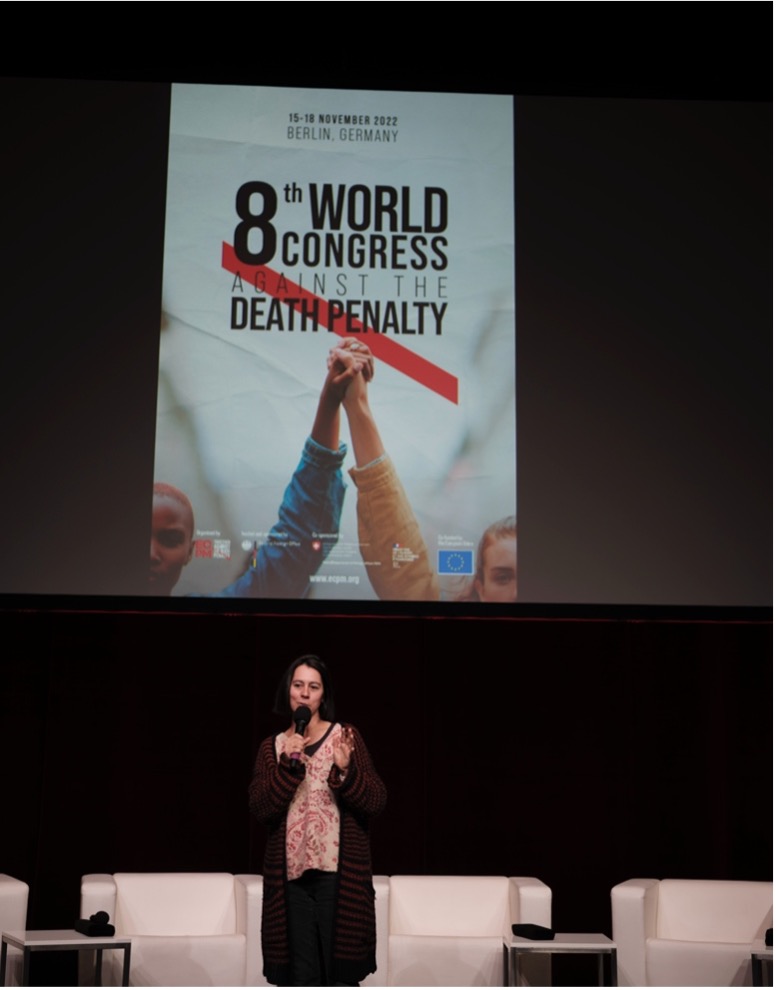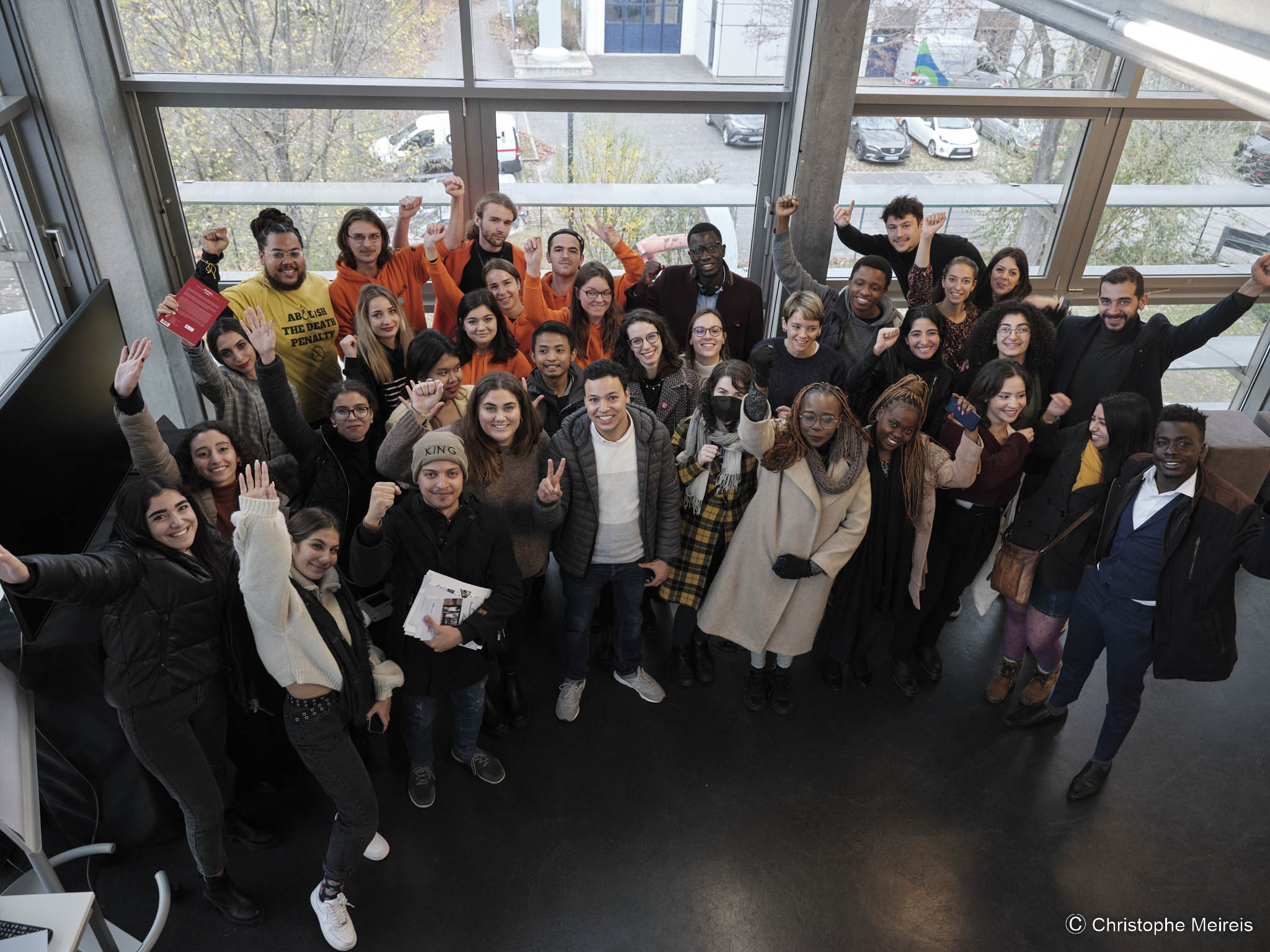
What was your thinking behind the Abolition Now Tour project?
I have always based my work on the following concepts:
- Mutual transmission between generations: The workshops were intended to encourage an enriching dialogue between young people and those long involved in organisations fighting against the death penalty. The aim was to understand how far we have come in this area and to support each other.
- Sustainability of the project: The aim of the workshops was to pass on methods that each member of each delegation could appropriate and re-use for their own projects or actions. Each participant was seen as a “multiplier” capable of amplifying the effects of these workshops. Great care was therefore taken to transmit “indirect” awareness-raising methods, based on creative techniques that also draw on local traditions, such as shadow theatre in Indonesia. These techniques have in common that they are visual, simple, require no specific or expensive equipment and are accessible to everyone, child or adult, literate or not. These “indirect” methods of talking about sensitive subjects such as the death penalty were also chosen to “protect” these young people, so as not to expose them directly.
- International dimension of the project: Attention was paid to creating bridges between the workshops and to connecting the members of each delegation so that they developed an “international awareness” of their joint participation in this project. This also helped them not to feel isolated in their actions, to move forward collectively in different countries and to draw inspiration from each other.
How did you feel at the Congress when you were reunited with the delegations in Berlin?
I was delighted to see most of the delegations present, but also very saddened and frustrated by the absence of some participants, in particular the DRC delegation, which was unable to obtain visas to take part in the Congress. It’s a difficult exercise to motivate a group of people who don’t know each other in two days to form a team and work together on a subject as complex and sensitive as the abolition of the death penalty, and even more so in a country where conflicts have been raging for many years. Participation in the Congress was one of the “promises” of the project and therefore a powerful driving force to encourage these groups to carry out advocacy work for abolition. Not being allowed to come to Berlin had a profound effect on young people in DRC. I worked during and after the Congress to restore their motivation and value their commitment, with the support of ECPM’s local partner.
That said, I was obviously very happy for the people attending the Congress. I was delighted to see them taking an active part in the programme at so many different levels, working with the Congress team to put the programme together, moderating the youth plenary session, enlivening certain moments with music or dance, or talking to the public about the results and progress of their actions.
How important do you think this type of project is for other human rights movements?
The sustainability of a human rights struggle depends on intergenerational transmission.
In many societies, the way older generations perceive youth or young adults is often marked by rather negative stereotypes regarding their concrete contribution to serious social or political issues. These stereotypes can take different forms but, generally speaking, the result is that the potential of these young people is underestimated. Many young people suffer from discrimination linked to their age or to a layering of different forms of discrimination, known as multiple or intersectional discrimination (age, gender, disability or other social or cultural criteria).
This “negative” perception reduces them to a rather passive role or, at best, to carrying out decisions taken by elders at all levels of society: their skills are not taken seriously, their energies or ideas are not valued, their voices are not listened to, they are not included or consulted when important decisions are taken, they are not trusted.
This type of project allows us to challenge these stereotypes, to question them and to open our eyes to the extraordinary resources that these young people possess. When these resources are valued, they never cease to amaze! Any organisation working for human dignity and respect for human rights can draw inspiration from this type of project, where it is young people who determine the course of exchanges, who express their wishes, needs and reservations. Their own life experience is valued and they are encouraged to have confidence in their knowledge and understanding of a subject and their environment in order to put forward their ideas and advance a cause. It’s in a setting where the collective intelligence of the group is promoted that ingenious and creative ideas can emerge.
“Peer to peer” effects should also be considered. Youth attracts youth! Young people bring their “analogue and virtual” networks with them. They can reach many more people at the same time. And, in the digital age, they have mastered the skills needed to navigate virtually, express themselves and transmit messages in multiple ways. They are formidable allies for NGOs.
What results do you think the Abolition Now Tour has had for the abolitionist community?
Locally, during the workshops, many people involved in the project’s various partner organisations and members of the abolitionist community (lawyers, former death row prisoners, etc.) said that they had renewed hope and were impressed by the creativity, intelligence, commitment and contagious energy of these young people. They breathed new life into the advocacy work of the organisations that hosted them. As one of the project coordinators told me: “They showed me that we can approach this issue in a more creative way”. It’s inspiring!
Internationally, at the Berlin Congress, the presence of delegations from Indonesia, the United States, Kenya, Lebanon and Morocco made the event very dynamic, in particular by influencing or illustrating the subjects dealt with in the various sessions, by contributing creatively at different levels, by sharing their experiences of the project, and by approaching the other participants.
At the same time, the Congress also had a powerful effect on these young people, motivating them to continue working beyond the project to bring about abolition of the death penalty. Most of the delegations are keen to continue their teamwork. Here are a few examples of the concrete results that have come out of the project and the Congress:
- The Indonesian delegation wants to help increase the presence of the Asian abolitionist community at future congresses and continues to be actively involved in Indonesia.
- In DRC, in March 2023, the young people produced a video in which they introduce themselves, express their motivation to take action for abolition and call on other young people in DRC to join them.
- In the United States, the group organised an awareness-raising event in a bookshop. It plans to hold a conference to discuss how to create an event called “People’s Tribunal against Texas”. All the abolitionist organisations in Texas will be invited, as well as a range of speakers.
